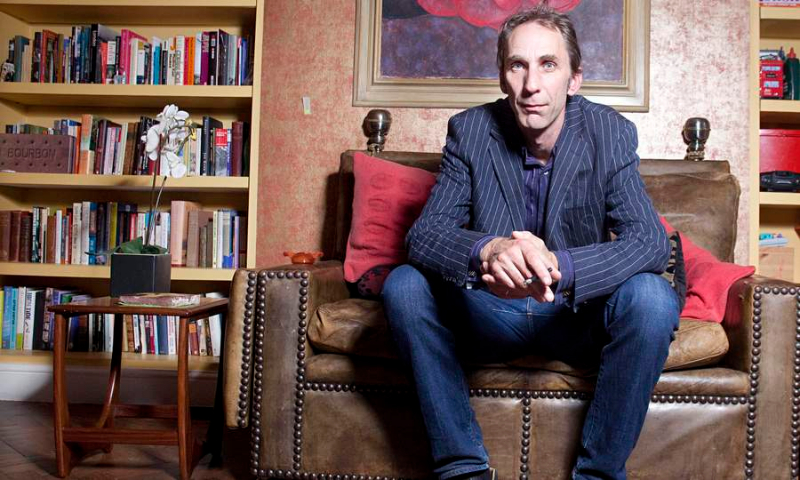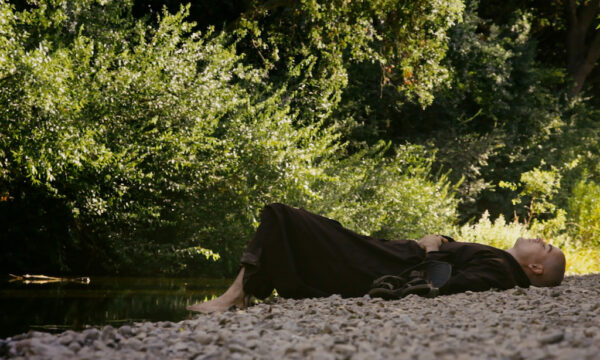ArchWay With Words 2014: Will Self in conversation

Will Self was at ArchWay With Words to promote his new work Shark. The Upcoming caught up with him at the literary festival to talk allegory, anarchy and humankind.
In your new book Shark, the image of the shark manifests itself in all kinds of allegorical forms. Do you like to think of the shark as being the menacing threat of our own irrationality, or even insanity, constantly swimming beneath the surface of our psyche?
WS: Yeah I think that’s the main meaning of the title, but specifically this idea that the release of nuclear fission into the world was a new kind of demonism. It’s not that people hadn’t been irrational or crazy beforehand, because clearly they had, but I think the inception of nuclear warfare made everybody psychotic in a strange way.
It’s somewhere in the book Zack Busner thinks “how can you respect any authority or government when you know that they’re stockpiling the means for your total annihilation?” The theory that was so influential on R D Laing, and the other anti-psychiatrists, was the “double-bind” – it’s basically like mummy saying [aggressively] “I LOVE YOU!” It’s two conflicting messages at once, and particularly for those of us who grew up in the Cold War, we felt the very solidity of the world being totally called into question, the fact that it could shiver and liquefy before your eyes. It’s a very shark-like thing.
Do you think there’s any weight to the notion that our collective cultural fascination and foreboding stems from the shark’s evolution many millennia ago to a specimen of near perfection? They are symbolic almost of an “anti-progress”, which goes entirely against the humanist “faith in progress” towards some kind of unattainable ideal. Do we perhaps have species envy?
WS: I hadn’t really considered it in quite that light, but it’s an extremely good observation. I didn’t so much think of that, and I kinda wish I had actually!
I reviewed a book called Deadly Powers about the origin of human nemesis, which really goes back to Aristotle and beyond, that human art starts in the mimicry of animals. And of course, the top predators are incredibly important in the mythology of the traditional peoples, and normally sharks are used to construct chimeras (mixtures of humans and animals), so that idea is very much lying behind it. But yes, I think that’s right, you’ve put it very well, they fly in the face of the Enlightenment; they’re “steampunk” in a sense that it’s a genre founded on the idea of discontinuous technology. But the paradox of steampunk of course, is that this world is steampunk, we live in a world of discontinuous technologies and it’s really just a camp form of that.
Do you share J G Ballard’s wary, but almost gleeful, ambivalence about the onward march of new technology? Or do you think humankind is gradually surrendering itself to technological advances that it really shouldn’t?
WS: I share Jim’s curious ambivalence. I find it, not so much in shiny, flashy gadgets, but in the city. I loathe what money is doing to London, how it’s grinding any sense of community or comedy out. You know, the big thing about London was that municipal socialism worked in a way here and it did level things out a bit, and that’s all now being thrown into reverse. But at the same time I can’t help but love the Shard! I find all that big construction really exhilarating.
As someone with left-wing/anarchist views – like yourself – I at times, find myself fired up by the idea of a society removed from authoritarian power structures that impoverish and perpetuate social divisions, with people taking control of their own work and lives. But then another day I’ll read someone like John Gray and get bogged down in the nihilistic thought of “what’s the point?”, we have no free will, we are not masters of our own destinies, humankind is too adverse to mutual co-existence. I wonder whether you ever experience these conflicting thoughts and how you resolve them, if indeed you do?
WS: John Gray’s amazing book Straw Dogs came at a very interesting time, because the Iraq War really was the point at which the old ideas of internationalist socialism really fell crotch-first onto the vaulting horse of history. It really exposed that aspect of the socialist project completely, and I think it became very difficult after Iraq to think of yourself unproblematically as a socialist. But I have to say, John, as we’ve since become friends, is not at all pessimistic, he’s a stoic at heart.
I’m very much into psycho-geography, obviously influenced by yourself and people like Iain Sinclair, the Situationists. Is there a “dream” psycho-geographic walk that you’ve yet to do?
WS: There are lots I’d like to do and there’s lots I’ve planned that haven’t come off yet. Tehran is laid out very well for psycho-geographic expeditions, because the airport is positioned south, and the city is built up the flank of a hill, so in about two days you could walk and see the city as a whole. So I’d like to do that one. I’d like to walk from here to Paris through the Channel Tunnel.
Can you do that?
WS: Well there is a service tunnel. They found this Russian guy sort of staggering about near the English-end of the tunnel not long back; he’d walked the whole way!
I had a thought the other day: has Guy Debord’s “spectacle” been realised in some way by the web? Are the heirs of the Situationists, by some bizarre twist, Google Maps, seen as how they reconfigure the globe entirely to the whim of their own commercial imperatives?
WS: Well it’s just algorithms. What it hasn’t got is the derive, let alone the detournement. So it’s not quite Debordian what Google do, but yeah, it’s here, it has arrived. But while I talk melioristic, I am personally quite pessimistic. It’s hard not to see that elements of people’s psyches are going to become seriously commoditised, people are going to start having product placements in their dreams.
In the not-so-distant future, people will be defined more and more by their digital profiles, their “online selves”. Instead of being defined by what clothes they wear or what products they buy, it’ll be the labels attached to the digital profile.
WS: I’m sure that’s right, it’s a very age-geared thing. I didn’t have a 3G phone or a wireless-enabled phone until about two years ago, and when I got it I was hopelessly addicted to it. It was comic. I’d excoriated everyone around me for spending their lives looking at their crotches and there I was full-on obsessed for about six months, still powerful for about nine months, and then just over. Completely over, like it had never happened. And now the technology has no affect for me at all, in that way.
I’m just old enough to remember having to corral my parents into letting me dial up to the internet for maybe ten minutes every evening. Kids growing up now in a digital landscape will have no conception of life without it.
WS: Well that just shows how you can’t help but valorise the Gutenberg culture, because all the clued-up, smart young people I know are all trying to age themselves out of being digital natives, and you’ve done it most eloquently. You’re right, it’s 2004, when people start to get wireless and broadband in and outside the home, that’s the moment it all changes. I always maintain, if you were a child at that point then you’re different. But you’re arguing that you weren’t a child at that point, if you see what I mean?
The screen really is a primitive instrument now isn’t it? The next stage is already beginning with Google Glass.
WS: Yeah but is anyone really bothering with it…?
Well no, no one’s going to want to wear those clunky glasses for any serious period of time, but as soon as you get the functionality, Google contact lenses perhaps, that symbiosis with technology, I think the screen age will pass into history.
WS: Yes that’s true, but it’s very powerful, the screen and the frame. The conception of Euclidean space embodied in all framing is very deeply encrypted and relates to a Panopticon-view of the Judeo-Christian deity, and certain kinds of ideas about how the world really is, that are highly congruent with systems that we’ve handed our lives over to in general.
So all I would say is, you think how long particular skeuomorphs endure, the screen is certainly going to be a super-powerful skeuomorph and it’ll take a lot to wean people away from replicating it. It’s replicated in transport systems – you drive looking at a map on a screen, you sit in a train staring out of a screen. And the screen is old; it’s as old as easel painting as a way, so I wouldn’t count it out that fast. But it will be generational, because people like me – what do we fucking know?! Nothing!
I understand your arguments about the death of the novel, and I’m with you a lot of the way, but do you think the problem is more to do with the fact that there isn’t as yet a coherent internet literature that accurately explores what it’s like living in a digital landscape?
WS: Yes there is, it’s called computer games.
But is there the same intellectual stimulation?
WS: Not yet. But it’ll come.
Will there be a Ulysses of the digital world?
WS: Why not? The problem with video games is that the conventions of how to modulate personations haven’t been figured out yet, because it has to be done by trial and error. They have to consider what’s going to make people feel simultaneously a degree of identification, and that strange thing that readers of fiction experience, of still feeling that there is a conditional element to the characters’ behaviour, that your empathy towards them has some psychological reality to it, and, as you say, at the same time the objectivity to be discursive or intellectual with it.
I think there’s an elitist thing that comes with it as well though: a lot of people decide to read high culture novels in order to show off about it. That has to stick around surely, the aesthetics of the book shelf that people use to identify themselves?
WS: I think that’s exactly what won’t make the cut actually. And that’s what’s so disturbing. All you see in the street are shelves that people have thrown out. It’s a total interregnum in the whole parameters of what it means to be intellectual, educated, cultured. It’s just game over in that sense.
Michael John
Will Self was at ArchWay With Words, which runs until 24th October 2014 at various venues across Archway. For further information or to book visit here.
























Facebook
Twitter
Instagram
YouTube
RSS